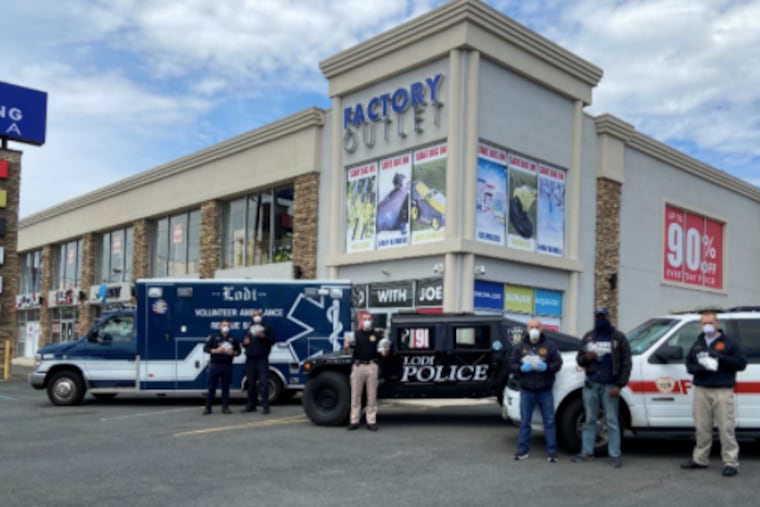Businessmen become ‘mask men’ in Operation Batman
Local entrepreneurs filling the need for protective equipment for those on the "second, third, and fourth lines" in the fight against COVID-19 pandemic.

In comic books, the bat signal is a stylized emblem projected in the night sky over Gotham City, an urgent call for help.
Drew Katz, Joe Cohen, and Robert LoCascio are far from superheroes. The businessmen are the first to make that clear.
But they recognized the need to help medical workers, first responders, and countless others who are on the front lines of the battle against the coronavirus. They also knew they were in a position to make a difference.
So they’ve undertaken an ambitious effort to procure and distribute protective masks to hospitals, police precincts, fire stations, nursing homes, and other places where workers run high risks of exposure and infection. They call their project “Operation Batman.”
“We needed to have a name for it internally,” said Katz, a Philadelphia-area entrepreneur and philanthropist. “We’re delivering masks. Batman was the masked man.”
The businessmen have used their financial resources, connections, and expertise to procure thousands of masks, mailing out dozens of shipments that have ranged in size from 50 to 200 units (each unit contains five masks) to the Ronald McDonald House in Camden, Little Sisters of the Poor elderly home in Totowa, N.J., St. Mary’s Medical Center in Langhorne, Pa., and Elmhurst Care Center in Queens, N.Y., among numerous other places.
The masks have arrived in a box, like a surprise gift from distant and admiring benefactors, with a label with these words printed inside a large pink heart: “We are in awe of all that your teams and you are doing on the front lines of this battle. Your brave commitment is what is going to save our country. We have purchased these KN95 masks for your staff’s protection as a way of saying, ‘THANK YOU!’”
Katz said smaller organizations such as nursing homes and long-term care facilities, first-aid squads, local hospitals, and police and fire departments are filled with individuals who are in the “second, third, and fourth line of defense” and have struggled to acquire equipment because of the massive need by major hospitals and medical centers.
Separately, Katz purchased and distributed 50,000 masks — which had been procured by Cohen through his supply chain contacts in China — to Temple University Hospital. Katz, who grew up in Cherry Hill and maintains a residence in Philadelphia, is a member of Temple’s board of trustees. He is the son of the late Lewis Katz, who was an owner of The Inquirer before he died in a 2014 plane crash.
“We’re all just trying to do what we can, where we can, when we can,” said Drew Katz, chief executive officer of Interstate Outdoor Advertising and creator of the Rachel and Katz Foundation, a charitable organization with an emphasis on support for at-risk children.
Katz said the efforts of Cohen, LoCascio, and himself sprung from a spirit of philanthropy inspired by others.
“I was raised by my parents to try to make the world a better place,” Katz said. “Personally, it has been devastating to me to see the carnage to the world, the carnage to our economy, created by this virus.
“I’ve personally lost three friends in [April]. I think all three of us feel the same way, that we need to try to do what we can, however we can.”
Cohen, who owns Snow Joe and Sun Joe, an outdoor equipment business based in Carlstadt, N.J., said he was “disgusted” by price gouging that arose in the marketplace as state governments, municipalities, hospitals, police and fire departments, and others scrambled to acquire personal protective equipment in the early days of the spread of the disease.
Through his business connections in China and elsewhere, Cohen has been able to procure large shipments of masks and has turned his current focus to selling non-medical-grade equipment to consumers. Cohen said average consumers have been largely underserved in the rush to protect those on the front lines.
Cohen said his business had a “robust supply chain” overseas that has been disrupted by the complications and urgency created by the coronavirus.
“It’s a living hell,” Cohen said. “It’s like the Wild, Wild West every day. The prices are changing every day. It’s just a mess.”
Cohen and Katz said the businessmen plan to continue “Operation Batman” as long as there is a need for masks.
“Just to be able to help in some small way, it’s a great feeling, and something we’re committed to helping as much as possible,” Cohen said.